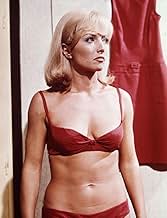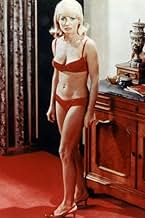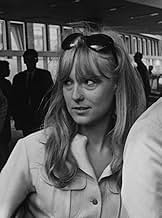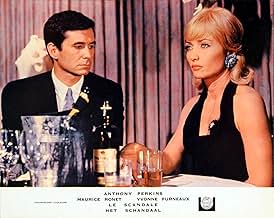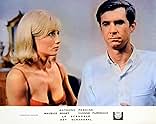VALUTAZIONE IMDb
5,8/10
911
LA TUA VALUTAZIONE
La moglie di un ricco magnate, sospetta che l'amante gigolò del marito lo abbia incastrato per omicidio.La moglie di un ricco magnate, sospetta che l'amante gigolò del marito lo abbia incastrato per omicidio.La moglie di un ricco magnate, sospetta che l'amante gigolò del marito lo abbia incastrato per omicidio.
- Regia
- Sceneggiatura
- Star
- Premi
- 1 vittoria in totale
Henri Attal
- Attacker in Dark Coat
- (non citato nei titoli originali)
Robert Burnier
- General at Evelyn's Party
- (non citato nei titoli originali)
Colin Drake
- Evelyn's Party Guest
- (non citato nei titoli originali)
Pierre Gualdi
- Bishop at Evelyn's Party
- (non citato nei titoli originali)
Raoul Guylad
- Customer at Denise's Shop
- (non citato nei titoli originali)
Catherine Langeais
- Evelyn's Party Guest
- (non citato nei titoli originali)
Denise Péronne
- Party Guest Who Had Met Christopher
- (non citato nei titoli originali)
Recensioni in evidenza
French actor Maurice Ronet ("Purple Noon") is front and centre here as Paul Wagner, a free-spirited playboy. He is pressured by Christine Belling (Yvonne Furneaux, "Repulsion"), the wife of his good friend Christopher Belling (Anthony Perkins of "Psycho" fame), to sell his champagne business to American interests. (Represented by character actors Henry Jones ("The Bad Seed") and George Skaff ("Topaz").) But complicating matters is the fact that after Paul emerges from drunken stupors, dead female bodies are found in his vicinity. Since he hasn't been quite right since an incident in the films' opening business, he worries that he's losing his mind once again.
Critics weren't overly kind to this psychological thriller from French filmmaker Claude Chabrol, feeling that the plot was simply too convoluted. But, in truth, it's not all *that* complex, and it does have surprises in store for the viewer, including the ultimate identity of the killer, revealed to be a VERY ruthless sort. The film is extremely well shot in Technovision by Jean Rabier, and features a pleasant score by Pierre Jansen. It's noteworthy for being rather irreverent, and Chabrol gets an uncharacteristic, amusingly comic turn out of Perkins. This is the loosest that this viewer has ever seen the actor. Ronet, playing the one character in "The Champagne Murders" worthy of some sympathy, does a very effective job, but the film truly belongs to a fantastic Stephane Audran ("Babette's Feast") as the secretary.
Commendably, Chabrol may end this with the expected confrontation between principal characters, but dares to prevent the audience from feeling total satisfaction by ending the film without a true resolution.
Written by American film critic Derek Prouse and French screenwriter Claude Brule ("Barbarella"), based on an idea by William Benjamin; the dialogue for the French-language version was scripted by Paul Gegauff. This was the first of two pictures that Perkins acted in for Chabrol; the second was "Ten Days Wonder".
Seven out of 10.
Critics weren't overly kind to this psychological thriller from French filmmaker Claude Chabrol, feeling that the plot was simply too convoluted. But, in truth, it's not all *that* complex, and it does have surprises in store for the viewer, including the ultimate identity of the killer, revealed to be a VERY ruthless sort. The film is extremely well shot in Technovision by Jean Rabier, and features a pleasant score by Pierre Jansen. It's noteworthy for being rather irreverent, and Chabrol gets an uncharacteristic, amusingly comic turn out of Perkins. This is the loosest that this viewer has ever seen the actor. Ronet, playing the one character in "The Champagne Murders" worthy of some sympathy, does a very effective job, but the film truly belongs to a fantastic Stephane Audran ("Babette's Feast") as the secretary.
Commendably, Chabrol may end this with the expected confrontation between principal characters, but dares to prevent the audience from feeling total satisfaction by ending the film without a true resolution.
Written by American film critic Derek Prouse and French screenwriter Claude Brule ("Barbarella"), based on an idea by William Benjamin; the dialogue for the French-language version was scripted by Paul Gegauff. This was the first of two pictures that Perkins acted in for Chabrol; the second was "Ten Days Wonder".
Seven out of 10.
Curiously uninvolving despite fine cast and several memorable scenes of bourgeois grotesquerie accompanied by vaguely Hitchcockian touches. The English dubbing didn't help.
This was a movie that French director Claude Chabrol made just before the period considered his golden era in which he knocked out a number of excellent dramatic thrillers. It would only be fair to say that with this one he hadn't quite nailed the formula, as while it has a complex plot, it ultimately doesn't add up to all that much by the end. The story features a young couple who try to convince, Paul Wagner, the mentally unstable owner of a respected champagne business to sell his company to another corporation. Matters are complicated when on a trip to Germany, a girl Wagner meets is murdered while he experiences a blackout, while back in France the same thing happens once again. These events are used as leverage to blackmail him into giving up his company.
It's got to be said that this one takes a while to get going. It begins with a scene involving a gang attack, which kind of sits a bit awkwardly in the story, and it is only alluded to later on but left essentially adrift from everything else. After this, we watch some rich types involve themselves in a series of vaguely interesting activities but it is really only once the first murder finally occurs that the story becomes interesting. It sort of gets by after that but you would be hard pushed to say by the end that it was anything too out of the ordinary or inspired. Still, any film that features the incredibly alluring Stéphane Audran gets plus points from me basically from the get-go, and while she does have an admittedly smaller role than she would have in Chabrol's later films, it is an important one. Frankly, Audran was a huge reason that many of the films from Chabrol's golden era were so good and in this instance, even with limited screen-time she is still head and shoulders above everybody else. There was a neat disguise reveal later on which had me fooled and the movie does end on a commendably strange final shot. Ultimately, this is certainly worth a watch if you like Chabrol or Audran, although it is for sure one of their lesser collaborations.
It's got to be said that this one takes a while to get going. It begins with a scene involving a gang attack, which kind of sits a bit awkwardly in the story, and it is only alluded to later on but left essentially adrift from everything else. After this, we watch some rich types involve themselves in a series of vaguely interesting activities but it is really only once the first murder finally occurs that the story becomes interesting. It sort of gets by after that but you would be hard pushed to say by the end that it was anything too out of the ordinary or inspired. Still, any film that features the incredibly alluring Stéphane Audran gets plus points from me basically from the get-go, and while she does have an admittedly smaller role than she would have in Chabrol's later films, it is an important one. Frankly, Audran was a huge reason that many of the films from Chabrol's golden era were so good and in this instance, even with limited screen-time she is still head and shoulders above everybody else. There was a neat disguise reveal later on which had me fooled and the movie does end on a commendably strange final shot. Ultimately, this is certainly worth a watch if you like Chabrol or Audran, although it is for sure one of their lesser collaborations.
This bizarre but intriguing opus from what is traditionally referred to as his 'fallow' period, turns out to be the template for most of Claude Chabrol's subsequent output. He is often compared to Alfred Hitchcock and ironically this film has been made for Universal Studios which accounts for the presence of Anthony Perkins from 'Psycho' and Henry Jones from 'Vertigo'. It is to be lamented that the dubbed American version has been cut by about seven minutes so as to blunt the sexual aspects, not least the homoerotic element between Christopher and Paul.
Although not quite as polished and well-crafted as his later films in this genre there are some stylistic flourishes not least the showy overhead final shot and is eminently watchable thanks to its talented and attractive leading players. Anthony Perkins in his first of two films for this director, employs his boyish charm and inherent quirkiness to fullest effect whilst Maurice Ronet's performance as the supposedly deranged Paul is a veritable tour de force and arguably one of his finest. On the distaff side is the fabulously feline Yvonne Furneaux whilst Chabrol's wife Stéphane Audran assumes a greater importance here in a double role and would soon take centre stage in his mid-period masterpieces. Slinky Suzanne Lloyd plays Sylvie whose lengthy scene with Ronet is one of Chabrol's most surreal.
Chabrol's 'A' Team is very much in evidence here in terms of the glossy cinematography of Jean Rabier, taut editing by Jacques Gaillard, incisive dialogue by Paul Gégauff and score by Pierre Jansen which on this occasion is alas somewhat intrusive.
This film, for this viewer at any rate, is very much 'work in progress' but displays a refinement of technique that over the next few years would establish Chabrol's reputation as an acknowledged master of the psychological thriller.
Although not quite as polished and well-crafted as his later films in this genre there are some stylistic flourishes not least the showy overhead final shot and is eminently watchable thanks to its talented and attractive leading players. Anthony Perkins in his first of two films for this director, employs his boyish charm and inherent quirkiness to fullest effect whilst Maurice Ronet's performance as the supposedly deranged Paul is a veritable tour de force and arguably one of his finest. On the distaff side is the fabulously feline Yvonne Furneaux whilst Chabrol's wife Stéphane Audran assumes a greater importance here in a double role and would soon take centre stage in his mid-period masterpieces. Slinky Suzanne Lloyd plays Sylvie whose lengthy scene with Ronet is one of Chabrol's most surreal.
Chabrol's 'A' Team is very much in evidence here in terms of the glossy cinematography of Jean Rabier, taut editing by Jacques Gaillard, incisive dialogue by Paul Gégauff and score by Pierre Jansen which on this occasion is alas somewhat intrusive.
This film, for this viewer at any rate, is very much 'work in progress' but displays a refinement of technique that over the next few years would establish Chabrol's reputation as an acknowledged master of the psychological thriller.
This is not really an early Chabrol who had already been making films for over fifteen years but it does come just before he fully got into his stride and his golden period began with Le Boucher. Fascinating here to see Anthony Perkins with Maurice Ronet and the lovely Stephane Audran, not sure if he knew English or was dubbed but he looks fine. Trouble here is that Chabrol takes forever setting this up and we have to spend what seems an interminable amount of time as the rich are seen to party pathetically with their business transactions forever hovering. Once things do get going there are some great scenes and we struggle to make out who is doing what and for why. Could have done with some of that cinematic style early on but certainly worth a watch for the second half. Apparently referenced in Kill Bill 1 and 2 and I'm guessing that it is the final overhead scene shot in retreating fashion that could Tarantino's eye.
Lo sapevi?
- QuizClaude Chabrol made this film for an American company, Universal, and with some American and British actors in prominent roles. Each scene for the film was filmed in both French and English versions, with the result that it got widely released in Britain and America. The English-language version was mostly scripted by the veteran British film critic Derek Prouse. Chabrol, who spoke excellent English, was able to maintain complete artistic control over the project.
- Citazioni
Christopher: [to Christine who is trying to seduce him] I'm sorry darling. I don't really feel too well. I'm tired. It's always like this when I haven't had enough television.
- ConnessioniReferenced in Kill Bill - Volume 1 (2003)
I più visti
Accedi per valutare e creare un elenco di titoli salvati per ottenere consigli personalizzati
- How long is The Champagne Murders?Powered by Alexa
Dettagli
- Data di uscita
- Paese di origine
- Lingua
- Celebre anche come
- The Champagne Murders
- Luoghi delle riprese
- Atlantic Hotel, St. Georg, Amburgo, Germania(Hotel where Wagner's stays.)
- Azienda produttrice
- Vedi altri crediti dell’azienda su IMDbPro
- Tempo di esecuzione1 ora 45 minuti
- Mix di suoni
- Proporzioni
- 2.35 : 1
Contribuisci a questa pagina
Suggerisci una modifica o aggiungi i contenuti mancanti

Divario superiore
What is the French language plot outline for Le scandale - Delitti e champagne (1967)?
Rispondi
